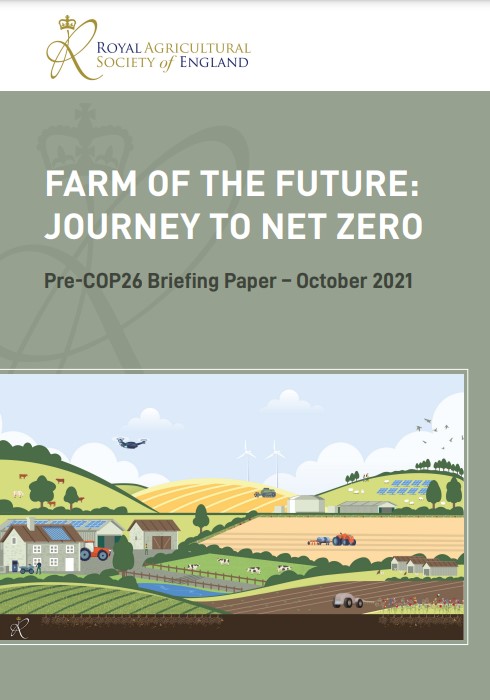Farm of the Future - Journey to Net Zero
Report from RASE on getting to Net Zero.

As stewards of much of the UK’s landmass, farmers have the resources to increase carbon sequestration in soils, grasslands, hedges and trees and at the same time ‘farm carbon’ to produce food. Agriculture is therefore key to reducing emissions and helping the UK meet its climate targets. However, this will require systemic change in farming practices and across the food supply chain. Increased investment in research and development into innovative systems and technologies applied to livestock and crop husbandries will enable farm businesses to reduce greenhouse gas (GHG) emissions e.g. methane mitigation strategies, diesel fuel replacements, carbon sequestration techniques, precision crop treatments using AI and robots. Rural decarbonisation involves enhancing soil and water quality, boosting biodiversity and reducing food (and food waste) miles. Improving food security whilst protecting rural livelihoods and farm incomes will require changes in the way we farm and must involve reduced reliance on fossil fuels, as well as land management practices which sequester carbon. As high-carbon fuels - including diesel, LPG and heating oil - are phased out, alternative clean and adoption-ready on-farm energy technologies will pave the way for zero-emission fuels. On-farm renewables, combined with battery storage and smart applications of robotic machines and digital systems will challenge established farming practices. Across agri-food supply chains, more circular resource-use models will replace wasteful disposal of bio-materials and residues found in current ‘linear’ systems. British farmers are well-positioned to deliver the transition to a more sustainable lowcarbon agri-food economy. Their commitment and innovation deserves the nation’s full support.
Key Messages:
Effective systems to provide sound economic valuation of natural capital will help support the UK’s decarbonisation goals and enhance food security, as well as action to restore soil health, increase biodiversity and better manage valuable land and water resources.
• Farmers, responsible for managing a large percentage of the UK’s landmass, have a vital part to play in the implementation of the country’s low carbon transition plans, both in terms of sequestration through land management and renewable energy generation. Following COP26, policies should place agriculture at the heart of these plans - to mobilise farmers and land managers in delivering “systems change” whilst maintaining a vibrant rural economy.
• Agriculture is at the core of a food supply chain driven by consumer choice. As consumers become more aware of the environmental impact of their food (and food waste) choices this will encourage and drive the economics of change. Standardised environmental labelling on food (including carbon), supported by standardised farm-level emissions accounting, would inform consumer choice, promote low carbon initiatives and improve the economics of local growers.
• More enlightened long-term, consistent cross-sectoral rural, energy and carbon transition policy integration and leadership is required, particularly with regards to circular resource use and measures to boost decarbonisation in rural areas.
• With so many systems choices and technology solutions available, farmers and land managers need access to timely, independent and cost-effective advice, on-farm demonstrations and information related to nature-friendly farming practices and renewable energy options. RASE experience has shown that on-farm demonstration sites and practical events such as those run by Innovation for Agriculture (IfA) and Groundswell represent the best way to drive change and inform learning. These activities deserve Government support and funding.
• The job of caring for land resources, whilst supplying food and remaining profitable, is a complex one in itself: policy and regulation should be designed to engage with farmers and other relevant stakeholders to ensure they are accessible, deliverable, user-friendly and avoid unnecessary ‘red tape’ wherever possible
